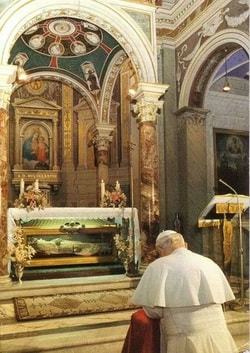 "John XXIII and John Paul II cooperated with the Holy Spirit in renewing and updating the Church in keeping with her pristine features, those features which the saints have given her throughout the centuries." - Pope Francis This past Sunday was a unique and amazing day of four popes, the two pope saints, John XXIII and John Paul II and the two living popes, Pope Francis and Pope Emeritus Benedict! The renewal and updating of the Church called for by the Second Vatican Council, initiated by St. John XXIII, and central to the work of the New Evangelization as articulated by St. John Paul II continued through the efforts of Pope Emeritus Benedict XVI, especially the Synod on the New Evangelization and finding even greater momentum through the witness of Pope Francis. Among them all, along with Paul VI, the Council, and Church leadership in general has called all of the baptized to engage in greater co-responsibility for the life of the Church and for the work of evangelization. Various pundits, both in Church and secular media, are quick to give their sometimes very simplistic analysis of why the two popes were canonized together and the message that Pope Francis is trying to convey. If there is any "message", I believe that it is a continued or re-commitment to the on-going renewal of the Church in trustful cooperation with the Holy Spirit and in prayerful communion with the saints. St. John XXIII and St. John Paul II were both visionary leaders who put forward programmatic plans for not simply renew of the Church as an institution, but renewal of all the baptized in faith and holiness who are called to go forth to the world and renew it as well. In 1959, St. John XXIII said, "Profession of the Christian faith is not intelligible without strong, lively apostolic fervor" (Princeps Pastorum, 32). The Second Vatican Council confirmed this understanding in Lumen Gentium through its teachings about the Universal Call to Holiness and the role of all the baptized in the mission of Christ. St. John Paul II was one of the drafters of the Decree on the Apostolate of the Laity (Apostolicam Actuositatem) along with the then Rector General of the Society of the Catholic Apostolate, Fr. Wilhelm Möhler. St. John Paul taught in his apostolic exhortation Christifedles Laici, which followed the Synod on the Laity in 1987, that The Second Vatican Council has reminded us of the mystery of this power and of the fact that the mission of Christ - Priest, Prophet-Teacher, King - continues in the Church. Everyone, the whole People of God, shares in this threefold mission (14). Just after the close of the first session of the Council, St. John XXIII canonized the Patron of the Catholic Apostolate Center, St. Vincent Pallotti, calling him "an innovator of new ways whereby people could come to know the love of God" (Cf. L'Osservatore Romano, January 23, 2013). Pallotti understood well the call of all to be apostles or what Pope Francis calls in Evangelii Gaudium, "missionary disciples" (120). The Center continues Pallotti's mission in the way that St. John Paul II described it to members of the Union of Catholic Apostolate when he said: Continue to multiply your efforts so that what Vincent Pallotti prophetically announced, and the Second Vatican Council authoritatively confirmed, may become a happy reality, and all Christians become authentic apostles of Christ in the Church and in the world! (Homily at San Salvatore in Onda, June 22, 1986). Mary, Queen of Apostles, pray for us! St. Vincent Pallotti, pray for us! St. John XXIII, pray for us! St. John Paul II, pray for us! Fr. Frank Donio, S.A.C., is the Director of the Catholic Apostolate Center
0 Comments
"The apostolate of the laity derives from their Christian vocation and the Church can never be without it."
These words come from the opening lines of the “Decree on the Apostolate of the Laity” (Apostolicam Actuositatem), one of the nine decrees that come out of the Second Vatican Council. They are quite moving and powerful documents that were handed down to us by the council fathers. This particular document on the laity shows that the Church is dependent on the apostolate of all people. But the term “apostolate” seems so daunting; clearly the word is rooted in the idea of being an apostle. I tend to think back to the Twelve Apostles, which creates a certain amount of anxiety. How can I even think about living up to the great examples of these twelve? Yet they are our example, and our apostleship is essential to the life of the Church. In the Church we tend to use the word apostle quite a bit and in many different ways. It appears in terms such as: apostolic, apostolate, and apostleship. To find a secular answer, I looked up the word “apostle” in a Merriam-Webster dictionary. In using a dictionary, my hope was that I might come to a better understanding of what it means to be an apostle. The first definition that I came across for apostle was "one sent on a mission." This first meaning really helps expand the idea of the New Evangelization in simple terms. The discovery of this definition led me to formulate the following question: "What is our mission as baptized Catholics?" This is a very important question that has been the subject of major debate. A simple answer is that we are called to go out into the world around us and proclaim the Good News of our Lord, Jesus Christ. How this is accomplished is a decision that must be made by each one of us. We must find our own niche in the greater mission of Christ. We have been given a divine mission that we must go out and complete. An interesting dilemma of this universal apostolic call is that for some reason people tend to shy away from it. I think that people tend to think that they are not worthy of such a calling or that they are not holy enough. Nothing could be further from the truth. We have all been given the necessary gifts from God to be able to be an apostle. These gifts are not always automatically known to us. Because of this, it is essential that we go out into the world and discover what our God-given talents are. Once we have become aware of our gifts, the task at hand becomes more manageable and attainable. Personally, I have found that being an apostle in the world today can be quite difficult. Through my active search and prayer to recognize the gifts and talents God has given me, I have discovered that I am someone who is easy to talk to. In response to this realization, I make myself available for people, especially my close friends, and I make sure that I both listen and give general advice when necessary. Doing this, however, can be difficult because there are many instances when time is limited, and I need to make a decision about what to put on hold. This can be difficult, so I stop to think about the things on my agenda versus the needs of the person seeking my counsel. Taking this time to reflect makes the decision quite clear. I developed a series of questions that has helped me in this process. I’ve found it very beneficial to go over them every now and again, particularly during the Lenten season. The questions are: Do I understand what it means to be a true apostle of Christ? Do I have an understanding of my mission at this current time in my life? Am I making decisions that help in my mission? Do I understand the gifts that God has given me to fulfill my mission? Do I thank God for these gifts and abilities? My hope is that you find these questions as helpful as I have. Mary, Queen of the Apostles, pray for us! Pat Fricchione is the Research & Production Associate for the Catholic Apostolate Center. Editor's Note: This post was originally published on March 27, 2012. Our Church breathes through the two lungs of Scripture and Tradition, and as members of the Church we are called to do the same to live a flourishing life. The Catechism of our Church explains the importance of Scripture saying, "And such is the force and power of the Word of God that it can serve the Church as her support and vigor, and the children of the Church as strength for their faith, food for the soul, and a pure and lasting fount of spiritual life" (CCC 131). In order to inspire a life of apostolic vocation with strength and vigor, we begin today our first installment of the "Scripture to Life" series. Through the intercession and example of Our Lady, Mother of God and Queen of Apostles, we hope that the Word of God may be enfleshed by you.
Throughout my spiritual journey I have always struggled with pinpointing the virtue of humility in my life. I don’t think this is due to any lack of desire for the virtue, (it usually isn’t) but rather a lack of true understanding of the virtue. In the Gospel passage of John 13, Jesus washes the feet of his disciples and as he approached, Peter asked, “Master, are you going to wash my feet?” Whenever I read this passage, I always anticipate what Peter says next: “You will never wash my feet!” For some reason, I am always drawn to Peter’s stark rejection of Jesus’ perfect example of humility. If you have practiced lectio divina before, you know that when a part of Scripture confuses the heck out of you, that is exactly the point where you must stop reading, close your eyes, and listen.; It is specifically in this moment that God seeks to transform you through the power of his living word. My meditation on this passage continues with reflecting on exactly what was going through Peter’s mind and heart at the moment of his objection: confusion and feelings of extreme discomfort. It is as if Peter, like many of us who strive for, yet lack the fullness of this most necessary virtue of humility, is saying: WAIT! I don’t understand! Why are you asking me to go this far outside of my “comfort zone” in order to be your disciple? One of the ways I ask my students to relate to Peter’s level of discomfort is by asking them to consider allowing me to wash their feet in front of their friends. As they all cringe and shout “that’s disgusting”, I simply say, multiply your level of discomfort by ten and that is probably how the apostles felt when Jesus began to wash their feet. Nevertheless, Jesus’ invitation to his apostles to accept this teaching is vital to their emerging role in the building up the Kingdom of God and one of extreme importance to his mission of salvation. His disciples must go beyond all levels of comfort in order to serve Him and to create His Kingdom on earth. Likewise, this invitation is extended to us, who are called to be apostles of Christ by joining in the Church’s mission of evangelization. However, like Peter (as well as my students and myself) most Christians in today’s world, cringe when Jesus invites them to serve in ways that take them beyond their comfort zone. Jesus is saying that it is precisely in the moments that lead us beyond ourselves, our fears and our assumptions, that we can do the greatest good in witnessing to the New Evangelization and building up the Kingdom. The great missionary and witness to the New Evangelization, Blessed Teresa of Calcutta once said, “Always take the more difficult road.” To me, there is no path more difficult than the path of humility and yet none more fulfilling. I have felt extremely uncomfortable at times when discerning the call of the Holy Spirit! Nevertheless, like Peter, I am immediately reassured with the words of Jesus’ gentle response: “What I am doing you do not understand now, but you will understand later.” Our task then, like Peter’s, is learning to respond with true understanding and true humility; for this is essential to our Christ-filled witness in the New Evangelization. Jesus, in this paradigm, testifies that when we reject the sin of self-absorption and are ready to serve selflessly we pave the way for God’s people to enter into the Kingdom of God: “For everyone who exalts himself will be humbled, but the one who humbles himself will be exalted.” Lk 14:11 Bart Zavaletta received a B.S. in Kinesiology from the University of Houston and a M.A. in Theology from the Oblate School of Theology, and currently teaches Theology at Skutt Catholic High School in Omaha, Nebraska. The Catholic Apostolate Center offers condolences and prayers for the victims and their families and all those affected by the tragedy during the Boston Marathon and the on going violence experienced. Please join us in continuing to pray for an end to violence and for peace throughout the world.
Mary, Queen of Peace and Queen of Apostles, pray for us. Prayer Attributed to Saint Francis of Assisi Lord, make me an instrument of your peace. Where there is hatred, let me sow love; where there is injury, pardon; where there is doubt, faith; where there is despair, hope; where there is darkness, light; and where there is sadness, joy. O Divine Master, grant that I may not so much seek to be consoled as to console; to be understood as to understand; to be loved as to love. For it is in giving that we receive; it is in pardoning that we are pardoned; and it is in dying that we are born to eternal life. Amen. An excerpt from Cardinal Sodano’s homily, given this morning during the Mass for the Election of a Roman Pontiff (full text): Brothers and sisters in Christ today’s Gospel takes us back to the Last Supper, when the Lord said to his Apostles: “This is my commandment: that you love one another as I have loved you” (John 15:12). The text is linked to the first reading from the Messiah’s actions in the first reading from the prophet Isaiah, reminding us that the fundamental attitude of the Pastors of the Church is love. It is this love that urges us to offer our own lives for our brothers and sisters. Jesus himself tells us: “There is no greater love than to lay down one’s life for one’s friends” (John 15:12). The basic attitude of every Shepherd is therefore to lay down one’s life for his sheep (John 10:15). This also applies to the Successor of Peter, Pastor of the Universal Church. As high and universal the pastoral office, so much greater must be the charity of the Shepherd. In the heart of every Successor of Peter, the words spoken one day by the Divine Master to the humble fisherman of Galilee have resounded: “Diligis me plus his? Pasce agnos meos… pasce oves meas”; “Do you love me more than these? Feed my lambs… feed my sheep!” (John 21:15-17) In the wake of this service of love toward the Church and towards all of humanity, the last popes have been builders of so many good initiatives for people and for the international community, tirelessly promoting justice and peace. Let us pray that the future Pope may continue this unceasing work on the world level. Moreover, this service of charity is part of the intimate nature of the Church. Pope Benedict XVI reminded us of this fact when he said: “The service of charity is also a constitutive element of the Church’s mission and an indispensable expression of her very being; (Apostolic Letter in the form of a Motu Proprio Intima Ecclesiae natura, November 11, 2012, introduction; cf. Deus caritas est, n. 25). It is a mission of charity that is proper to the Church, and in a particular way is proper to the Church of Rome, that in the beautiful expression of St. Ignatius of Antioch, is the Church that “presides in charity” “praesidet caritati” (cf. Ad Romanos (preface).; Lumen Gentium, n. 13). My brothers, let us pray that the Lord will grant us a Pontiff who will embrace this noble mission with a generous heart. We ask this of the Lord, through the intercession of Mary most holy, Queen of the Apostles and of all the Martyrs and Saints, who through the course of history, made this Church of Rome glorious through the ages. Amen.
The Catholic Apostolate Center would like to invite you to join in prayer and thanksgiving for our Holy Father, Pope Benedict the XVI, who will officially resign from his Petrine ministry this day. During his last Angelus blessing this past Sunday, Pope Benedict wrote:
During Lent, let us learn to give the right time to prayer, both personal and community prayer, which breathes air into our spiritual life. However, praying does not mean isolating oneself from the world and its contradictions, as St. Peter would have liked to have done on Mount Tabor, but prayer leads us back to the path, to action. Christian existence -- I have written in the Message for this Lent -- means to continuously climb up the mount for our encounter with God, so that afterward we can descend again filled with his love and strength to serve our brothers and sisters with the very love of God. Dear Brothers and sisters, this Word of God I feel in a particular way towards me, at this moment in my life. The Lord is calling me to "climb the mount," and to devote myself to meditation, reflection and prayer. However, this does not mean abandoning the Church, but rather, if God has requested this of me, it is so that I can continue to serve the Church with the same dedication and the same love with which I have done up until now, but in a way adapted to my age and my strength. Let us invoke Virgin Mary's intercession: Let her guide all of you to follow the Lord Jesus always, in prayer as well as in laborious charity. Let us follow in the example of Pope Benedict and root ourselves in prayer so that we might allow the spirit of humility and discernment to guide all our actions. Let us open our hearts to hear God’s promptings to use our gifts, talents, and abilities to best serve his Church. As has been emphasized before, the Catholic Apostolate Center is grateful for Pope Benedict XVI’s continual emphasis on the intrinsic connection between faith and charity, similar to St. Vincent Pallotti, founder of the Union of Catholic Apostolate and patron saint of the Catholic Apostolate Center. Pope Benedict’s humility in deciding to take this action is a great example for all of us seeking to be true servants of Jesus Christ. The Holy Father has been a gift to the Church, and the effects of his Petrine ministry will surely be felt for years to come. May Mary, Queen of Apostles, continue to guide Pope Benedict XVI, and may the Holy Spirit be with the College of Cardinals as they gather to elect his successor. The Catholic Apostolate Center invites you to join in prayer and thanksgiving for our Holy Father, Pope Benedict XVI, and for our Church at this time of transition. Pope Benedict XVI always emphasized the intrinsic connection between faith and charity, similar to St. Vincent Pallotti, founder of the Union of Catholic Apostolate and patron saint of the Catholic Apostolate Center. His humility in this decision is a great example of a true servant of Jesus Christ. The Holy Father has been a gift to the Church, and the effects of his Petrine ministry will be felt for years to come.
May Mary, Queen of Apostles, continue to guide Pope Benedict XVI, and may the Holy Spirit be with the College of Cardinals as they soon gather to elect his successor. Fr. Frank S. Donio, S.A.C., D.Min. Director Jubilee Message from His Eminence Tarcisio Cardinal Bertone on behalf of His Holiness Pope Benedict XVI
At the conclusion of the celebrations (of the aforesaid Religious Community) marking the 50th anniversary of the canonization of St. Vincent Pallotti, the Supreme Pontiff, Benedict XVI, happily joins (you) in thanking and praising God for the numerous spiritual benefits granted in this jubilee year and all through the nearly two centuries of faithful service by the Pallottines. During the past year every spiritual child of Pallotti has been able to draw invaluable lessons from the person and the work of the Founder and from the richness of his Charism inspired in him by the Holy Spirit and the precious teachings still relevant in the Church. St. Vincent recognized that the faith of his time was lukewarm; he committed himself to reviving it so that every believer might witness to the living God. His foundation – the Union of Catholic Apostolate – aimed at enlivening the faith and leading all to Jesus Christ. To that end the Saint also promoted several other concrete initiatives in order to enhance reverence for the ancient institution of the Church, and to animate and propagate sound doctrine. He also sought to multiply spiritual and corporal works of mercy urged on by the precept of charity, because God being love itself there is nothing more effective than works of charity to give a new impetus to the faith. Pallotti also strove to safe-guard the dignity of sacred buildings, propagate a simple explanation of the Gospel and proposed spiritual exercises for people of all walks of life. In short, he encouraged any work which, according to the time and circumstances, would prove opportune for the revival of faith. Our own times too manifests signs of a profound crisis as is evident in the words of Pope Benedict XVI: “the true problem of our moment of history is that God continues to disappear from the life of man, and shutting out the light of God man is increasingly struck by a lack of orientation; its destructive effects are becoming increasingly evident. (Letter to the Bishops of the Catholic Church, 10 March 2010). The Jubilee of the Pallottine family coincides with the Year of Faith declared by the Holy Father “to arouse in every believer the aspiration to profess the faith in fullness and with renewed conviction, with confidence and hope. It will also be a good opportunity to intensify the celebration of the faith in the liturgy, especially in the Eucharist, which is “the summit towards which the activity of the Church is directed; ... and also the source from which all its power flows.” At the same time, we make it our prayer that believers’ witness of life may grow in credibility” (Porta Fidei, 9). This is the true danger to the faith, that modern and post modern idols could assume the place of God. They enslave us with the yoke of new and subtle idolatry visible to all. In such a context the Holy Father invites every member of the Society of the Catholic Apostolate to a generous commitment to working towards rediscovering the way of the Gospel for the man of today, inspired by the message left by St. Vincent Pallotti: “to revive faith and rekindle charity, and lead all men to Christ”. The spiritual and apostolic journey of every component of the Pallottine Family springs from the contemplation of the life and sanctity of the Founder during this jubilee year. It, thus, becomes a confirmation of the words of the Encyclical Deus Caritas Est: “Faith tells us that God has given his Son for our sake and gives us the victorious certainty that it is really true: God is love! It thus transforms our impatience and our doubts into the sure hope that God holds the world in his hands and that, as the dramatic imagery of the end of the Book of Revelation points out, in spite of all darkness he ultimately triumphs in glory. Faith, which sees the love of God revealed in the pierced heart of Jesus on the Cross, gives rise to love. Love is the light—and in the end, the only light—that can always illuminate a world grown dim and give us the courage needed to keep living and working”. Living faith and active charity are the two pillars on which Vincent Pallotti built up his luminous life and his generous works. They are the two interior forces that have stirred and sustained the manifold apostolic initiatives of Pallotti. “Charity of Christ urges us” (2 Cor. 5:14) was his motto with which he also motivated his followers. The fruit of his labor matured into the foundation of the Union of Catholic Apostolate. Right from its very beginning it greatly valued the collaboration of all of the faithful in the Church – laity, priests and consecrated – enlivening the faith of each that he/she could become an authentic apostle, a bearer of the fire of God’s love. Sharing with the Pallottine family these reflections on the occasion of the 50th anniversary of the canonization of the Holy Founder, the Successor of Peter entrusts the entire Union of Catholic Apostolate to the heavenly protection of Mary most Holy, Queen of Apostles and model of charity, and to St. Vincent Pallotti, invoking a fresh outpouring of the Divine Spirit for a fruitful ministry at the service of the New Evangelization and cordially imparts his Apostolic Blessing. With great esteem, I remain Most devoted in the Lord +Tarcisio Card. Bertone This is an English translation of the Italian original sent to Fr. Jacob Nampudakam SAC, Rector General of the Society of the Catholic Apostolate. "The apostolate of the laity derives from their Christian vocation and the Church can never be without it."
These words come from the opening lines of the “Decree on the Apostolate of the Laity” (Apostolicam Actuositatem), one of the nine decrees that come out of the Second Vatican Council. They are quite moving and powerful documents that were handed down to us by the council fathers. This particular document on the laity shows that the Church is dependent on the apostolate of all people. But the term “apostolate” seems so daunting; clearly the word is rooted in the idea of being an apostle. I tend to think back to the Twelve Apostles, which creates a certain amount of anxiety. How can I even think about living up to the great examples of these twelve? Yet they are our example, and our apostleship is essential to the life of the Church. In the Church we tend to use the word apostle quite a bit and in many different ways. It appears in terms such as: apostolic, apostolate, and apostleship. To find a secular answer, I looked up the word “apostle” in a Merriam-Webster dictionary. In using a dictionary, my hope was that I might come to a better understanding of what it means to be an apostle. The first definition that I came across for apostle was "one sent on a mission." This first meaning really helps expand the idea of the New Evangelization in simple terms. The discovery of this definition led me to formulate the following question: "What is our mission as baptized Catholics?" This is a very important question that has been the subject of major debate. A simple answer is that we are called to go out into the world around us and proclaim the Good News of our Lord, Jesus Christ. How this is accomplished is a decision that must be made by each one of us. We must find our own niche in the greater mission of Christ. We have been given a divine mission that we must go out and complete. An interesting dilemma of this universal apostolic call is that for some reason people tend to shy away from it. I think that people tend to think that they are not worthy of such a calling or that they are not holy enough. Nothing could be further from the truth. We have all been given the necessary gifts from God to be able to be an apostle. These gifts are not always automatically known to us. Because of this, it is essential that we go out into the world and discover what our God-given talents are. Once we have become aware of our gifts, the task at hand becomes more manageable and attainable. Personally, I have found that being an apostle in the world today can be quite difficult. Through my active search and prayer to recognize the gifts and talents God has given me, I have discovered that I am someone who is easy to talk to. In response to this realization, I make myself available for people, especially my close friends, and I make sure that I both listen and give general advice when necessary. Doing this, however, can be difficult because there are many instances when time is limited, and I need to make a decision about what to put on hold. This can be difficult, so I stop to think about the things on my agenda versus the needs of the person seeking my counsel. Taking this time to reflect makes the decision quite clear. I developed a series of questions that has helped me in this process. I’ve found it very beneficial to go over them every now and again, particularly during the Lenten season. The questions are: Do I understand what it means to be a true apostle of Christ? Do I have an understanding of my mission at this current time in my life? Am I making decisions that help in my mission? Do I understand the gifts that God has given me to fulfill my mission? Do I thank God for these gifts and abilities? My hope is that you find these questions as helpful as I have. Mary, Queen of the Apostles, pray for us! Pat Fricchione is the Research & Production Associate for the Catholic Apostolate Center. |
Details
Archives
July 2024
Categories
All
|
About |
Media |
© COPYRIGHT 2024 | ALL RIGHTS RESERVED

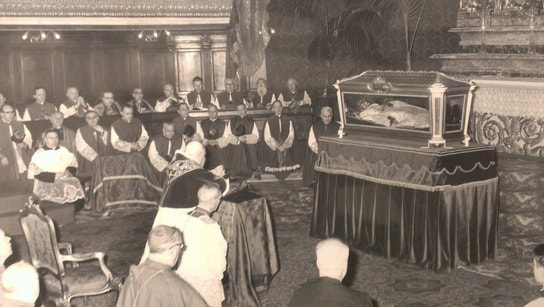


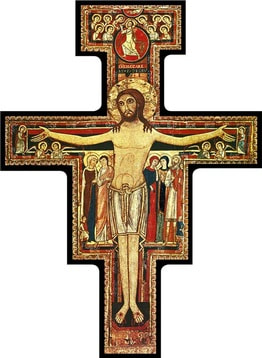
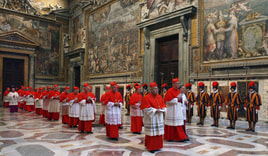
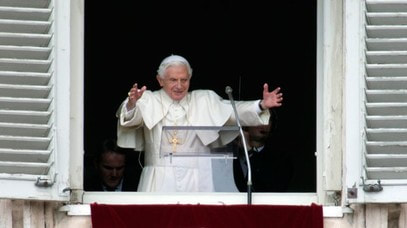
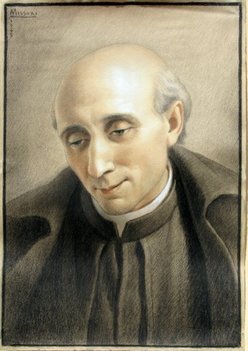
 RSS Feed
RSS Feed